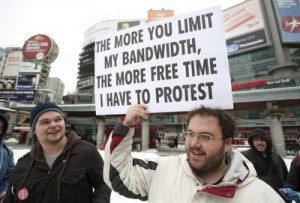
Moffett
A consolidated cable industry envisioned by Dr. John Malone, currently bidding for a merger between Charter Communications and Time Warner Cable, would feature widespread usage caps and usage billing and could obliterate competition from over-the-top online video providers, predicts a cable industry analyst.
Craig Moffett, now out on his own as co-head of independent Wall Street research firm MoffettNathanson, says broadband usage pricing is the sleeper issue of the last five years.
“I’ve written for years that [usage based pricing] is the single most important issue in all [the telecom sector],” Moffett said in an interview last week. “I’ve always been amazed by how little attention people have always paid to the issue.”
The Street reports that a unified cable cartel limiting consumer access to the Internet or more importantly monetizing that access would immediately devastate streaming video competitors including Netflix, Amazon, YouTube and Hulu.
If usage based pricing were implemented across the cable industry tomorrow, Moffett believes Netflix’s subscriber base would immediately fall from 30 million to 10 million. Nascent video players like Intel and Apple would likely find their business plans untenable, and some analysts believe the sweeping price changes would probably end the shift towards integrating streaming technology into large flat panel television sets.

Consumer backlash
Moffett says the impact would be broadly felt. Other analysts predict it could cause a national consumer uprising, especially at a time when other countries are swiftly moving to get rid of usage limits and consumption-based billing that have never been popular with customers.
“I think it will become clear that over the summer the window may have already closed for the cable operators to move to a usage based pricing theme,” Moffett said.
The Federal Communications Commission has done almost nothing about the issue of usage caps and usage pricing. Former FCC chairman Julius Genachowski even applauded the unpopular price scheme, calling it an important innovation.
Customers call it something else, and an uproar from consumers and competitors alike could overshadow the broadband successes of the Obama Administration. It would represent “a laughable setback for the nation’s communications infrastructure,” predict increasingly pessimistic Wall Street analysts concerned about the inevitable backlash.
The Street:
In a new broadband pricing regime, regulators would have to condone what consumers and competitors would immediately recognize as anti-competitive. Meanwhile, immensely popular content providers such as Netflix, Amazon Prime, Hulu, YouTube and the like would have to lose a Washington lobbying battle to the interests of cable monopolies, their arcane billing and off shored customer service.
Hollywood and broadcast networks would lose marginal new content buyers such as Netflix. Tablet makers such as Apple, Google, Samsung and Amazon would see the value of their fastest growing products put at risk.
Most importantly, it would be an affront to one of the few clear consumer victories for the Department of Justice in the Obama administration.


 Subscribe
Subscribe
If such a thing were implemented for our service we would no doubt be one of the many that would no longer utilize those streaming services as that’s about our sole use of internet – we cut the cord in 2006 paying for any TV broadcasts.
The consumer backlash to such a move would make the howling reaction to the original XBOX One (aka the XBOX 1984) details look mild. The horse is out of the barn and well down the road by now. Content streaming is so broadly and deeply engrained in consumer behavior that there would have to be special deals cut for the major content providers, at a bare minimum, and even then likely severe restrictions on any additional charges. If nothing else, consider the political windfall for elected representatives siding with outraged constituents against the Big, Bad Cable Companies. Even Big Cable… Read more »
This hasn’t even been a “sleeper” issue unless you count the fact that neither Google, Netflix, Hulu, or any of the big streaming companies that depend heavily on that backbone have done absolutely NOTHING to fight the caps which are threatening their business models.
We’ve known this to be a major issue for consumers for these past 5 years, the biggest player Netflix already has had their business hurt by current caps but hasn’t acknowledged or done anything significant to lobby against the practice.
Netflix at least talks about the issue. Google has its own network to bypass the problem altogether, and Hulu is owned and controlled by media conglomerates selling it to other conglomerates — the ones that can magically exempt Hulu from data caps. The FCC pretends usage capping doesn’t even exist as a real issue. But if you protest with signs in front of a cable company, reporters (which hate caps too) show up, quickly followed by elected leaders. Then the drama begins. Netflix should be cutting us a check for the efforts we made to stop Time Warner’s experiment in… Read more »
if caps go that low to 40gb example, you will have some serious backlash, people will prob just shut all services off that deal with the cable co, I know I would, I currently have basic cable and internet.. if they attempted that id shut it off completely (would rather pay to T-Mobile or a fixed wireless provider, yup lucky to have on here where I live)